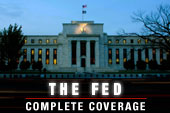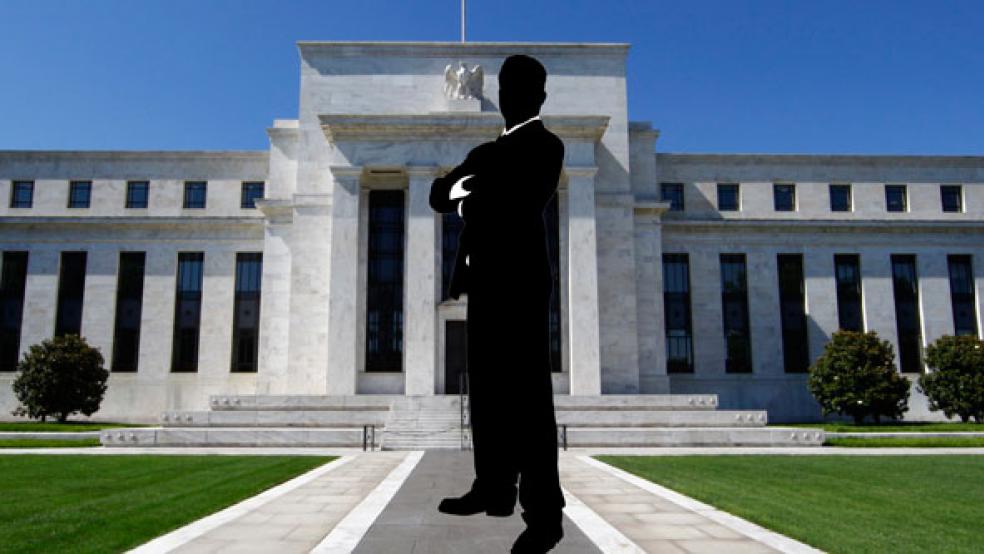Just eight men have run the Federal Reserve Board since Franklin Delano Roosevelt named Marriner Stoddard Eccles, the western Mormon banker who embraced the New Deal, to the newly reconfigured post of chairman. Three, including Eccles, have been long-reigning; two have served two terms and stepped down; and two have been short-timers.

It is beginning to look like no matter who wins next Tuesday’s election, the eighth Fed chairman, Ben Bernanke, whose second term expires on Jan. 31, 2014, will join the two terms-and-out crowd. Republican candidate Mitt Romney has vowed to replace him with someone favoring a less expansive monetary policy.
Meanwhile, a Bernanke friend told Bloomberg News in an off-the-record comment that the Princeton scholar of depression-era monetary policy, whom historians will credit with taking the decisive actions in 2008 and 2009 that prevented the U.S. economy from plunging into a second Great Depression, is anxious to step aside after eight tumultuous years in the top job. His term as a Fed governor doesn’t expire until 2020.
Though most voters haven’t given it a thought, the outcome of the election will have a major impact on monetary policy and therefore on the economy. Current policy is locked into near zero short-term interest rates until mid-2015 and the Fed has embarked on a series of bond purchases, so-called quantitative easing, to force long-term rates lower.
With Republicans in a divided government insisting on restrictive fiscal policies, monetary policy has shouldered the responsibility over the past two years for keeping the economy from plunging into a double-dip recession. A second Obama administration, should Bernanke step down, would appoint someone who promises to keep those policies in place – at least until the economy showed clear signs that it was on a glide path to sustained economic growth of at least 3 percent per year with unemployment declining rapidly.
Republican standard bearer Mitt Romney, on the other hand, has vowed to replace Bernanke with someone favoring tighter controls on the money supply. As early as September 2011, while fending off challenges from his right for the Republican nomination, the former Massachusetts governor blasted Bernanke’s second round of quantitative easing as “overinflat(ing) the amount of currency” without putting Americans back to work.
Nearly a year later, in an interview with Fox television, Romney said he wanted “monetary stability that leads to a strong dollar and confidence that America is not going to go down the road that other nations have gone down, to their peril.” In September, shortly before “moderate Mitt” emerged in the first debate with the president, Romney’s top policy adviser again attacked the Fed, this time for its third round of quantitative easing. “We should be creating wealth, not printing dollars,” Lanhee Chen said in a prepared statement.
One thing is certain. The independent Fed won’t change policies quickly or rashly, especially in an era of increased transparency in its actions. “This is a coherent institution,” said John Makin, an economist at the American Enterprise Institute. “You don’t get a divided Fed except under extreme conditions.”
So whom would Romney or Obama appoint to the powerful Fed top job? Speculation has focused on three possible candidates for each side, although it’s always possible for a wild card to emerge.
FOR ROMNEY, the leading candidates are:
Glenn Hubbard – The Columbia University business professor has been one of Romney’s top economic advisers and architect of his austerity budget for non-military domestic spending. If those policies succeed in promoting more rapid economic growth, it would allow Hubbard to begin raising rates at the Fed, which his candidate backs. While critical of Bernanke’s recent easing policies, Hubbard, who was briefly considered for the post in 2005 after serving as President George W. Bush’s top economic adviser, is no shrinking violet when it comes to Fed activism. He has proposed buying and refinancing the mortgages of underwater homeowners to rejuvenate the housing market.
John B. Taylor – If Romney wants to reassure inflation hawks and opponents of quantitative easing that he’s in their corner, Stanford University economist and frequent Wall Street Journal contributor Taylor could get the nod. He opposes using the Fed to fight unemployment – legally part of its duel mandate – and would instead target monetary policy strictly at keeping inflation in check. Fond of quoting Austrian economist Friedrich A. Hayek and his 1944 book, “The Road to Serfdom,” Taylor has called for economic reform strategies that “build on more predictable, rules-based fiscal, monetary and regulatory policies” to help restore economic prosperity.
Greg Mankiw – The Harvard economist and former chief economic adviser to President Bush is the most mainstream among Romney’s top economic advisers. He has publicly backed quantitative easing and called for targeting a higher inflation rate as one possible path to stronger economic growth. Though he’s refused interviews during the campaign season in an effort to keep his prospects for a top job alive, those intellectual wanderings off the GOP reservation probably make him a long-shot for the Fed post.
Wild Cards -- As Tom Hoenig neared the end of his 20-year run atop the Kansas City Fed, he became an outspoken critic of Bernanke’s quantitative easing policies. He also called for breaking up “too big to fail” banks and criticized the repeal of the depression-era law that prevented the merger of investment and commercial banks. While choosing Hoenig would send a valentine to small-town bankers and Rep. Ron Paul’s anti-Fed libertarians in the Republican Party base, it is unlikely that Romney, once elected, would thumb his nose at money-center banks on Wall Street, whose contributions helped put him in the White House. Ditto for Richard Fisher, head of the Dallas Fed, another inflation hawk and opponent of quantitative easing who has called for breaking up the big banks http://www.dallasfed.org/news/releases/2012/nr120321.cfm.
FOR OBAMA:
Janet Yellen – Appointed by Obama as vice chairman of the Fed in 2010, she is the obvious next-in-line if the president wins reelection. In addition to the symbolism of being the first woman to run the Fed, the former Berkeley professor and outspoken Keynesian brings all-star credentials as both an intellectual leader and an administrator, having run the San Francisco Fed. “I’m just opposed to a pure inflation-only mandate in which the only thing a central bank cares about is inflation and not employment,” she says. One former associate told Reuters her January 2011 and other speeches demolishing critics of quantitative easing took “communications to a whole new level. They were dense, they were excellent analyses.”
Lawrence Summers – If building consensus on a collegial Fed board is a requirement for the job, it is unlikely Obama will tap his former top economic adviser, who rubbed academic nerves the wrong way during his time running Harvard. But few at the highest levels of the Democratic Party are better qualified for the post. While the former Treasury Secretary and Wall Street consultant lurched left on fiscal policies and called for breaking up the biggest banks in response to the Great Recession, the Robert Rubin protégé is ideologically flexible and could lurch right again in search of what would be the capstone of his long career in and out of major financial institutions in Washington.
Alan Blinder – Bernanke’s former colleague in the Princeton economics department, the former Fed vice chairman’s columns in the Wall Street Journal have regularly criticized Congress’ premature austerity policies. He’s also expressed fears that the Fed may be running out of ammo to continue bolstering the economy. Last July, he made the radical proposal that the Fed drop the interest paid on bank reserves held at the Fed to zero, and if they didn’t expand lending, actually begin charging a fee for keeping money parked in the central bank. If wars over budgetary austerity dominate the early months of a second Obama administration, tapping Blinder to lead a more activist Fed might become the logical response.
Wild Cards -- Timothy Geithner has already announced plans to step down as Treasury Secretary in a second term. The logical next step for the former head of the New York Fed, though, is taking a high-paying job on Wall Street at one of the major banks he’s spent his life regulating. But one can’t rule out the allure of putting a crown jewel on his public service career. The other Democratic wild card is Erskine Bowles, a former investment banker, President Clinton’s former chief of staff, and leader of the president’s deficit commission. Bowles has been mentioned as a possible Treasury Secretary in a second Obama administration, a more likely slot for someone with limited monetary policy-setting experience.





